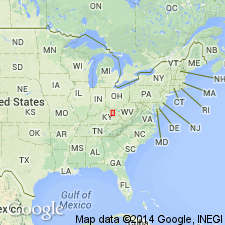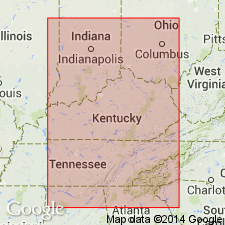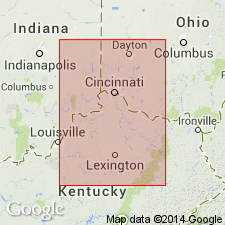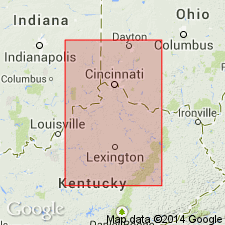
- Usage in publication:
-
- Bull Fork Formation*
- Modifications:
-
- Named
- Dominant lithology:
-
- Limestone
- Shale
- AAPG geologic province:
-
- Cincinnati arch
Summary:
Named for Bull Fork Creek, Mason Co., KY. Alternation of thin gray beds of shale and very fossiliferous limestone. About 200 ft thick in type area; thins to south. Conformably overlies Grant Lake Limestone; conformably underlies Preachersville Member of Drakes Formation. Previous workers have included the strata that make up the Bull Fork in the upper part of the McMillan Formation, the Arnheim, Waynesville, Liberty Formations, and all or part of the Whitewater Formation.
Source: GNU records (USGS DDS-6; Reston GNULEX).

- Usage in publication:
-
- Bull Fork Formation*
- Modifications:
-
- Overview
- AAPG geologic province:
-
- Cincinnati arch
Summary:
The Bull Fork Formation in north-central KY and southwestern OH consists of interbedded limestone and shale with shale increasing up section. The shale is mainly calcareous, medium gray to greenish gray, and fissile to poorly fissile. Limestone is (1) gray, fine- to medium-grained, fossiliferous, (2) olive gray, microgranular with sparse fossil fragments, and (3) medium- to bluish-gray, fine- to coarse-grained, well-sorted, and bioclastic. Fossils include brachiopods, bryozoans, solitary and colonial corals, gastropods, cephalopods, pelecypods, crinoids, trilobites, and ostracodes. Thickness is 200 feet. Overlies the Bellevue or Grant Lake Limestones and unconformably underlies the Silurian. The Bull Fork is of Late Ordovician age.
Source: GNU records (USGS DDS-6; Reston GNULEX).

- Usage in publication:
-
- Bull Fork
- Modifications:
-
- Not used
- AAPG geologic province:
-
- Cincinnati arch
Summary:
The Cincinnatian Series is divided into five depositional sequences in this report, which correspond to lithostratigraphic units. The following stratigraphic names in KY should be abandoned as they have been applied to bodies of rock already named in downramp areas of OH and IN: Bardstown (=Lower Whitewater), Reba (=Oregonia), Stingy Creek (=Mount Auburn), Calloway Creek (=Bellevue), and Clays Ferry (=Fairview). The following units in KY, OH, and IN lump dissimilar facies and straddle sequence boundaries and therefore should be abandoned: Drakes, Ashlock, Dillsboro, Tanners Creek, and Bull Fork. Grant Lake has been defined in several different ways and consequently should be abandoned. Several units will be redefined at a later date, including the Upper Whitewater and the "Sunset" and "Saluda" of OH and IN. Formal naming of new lithostratigraphic units will follow further study.
Source: GNU records (USGS DDS-6; Reston GNULEX).

- Usage in publication:
-
- Bull Fork Formation*
- Modifications:
-
- Areal extent
- AAPG geologic province:
-
- Cincinnati arch
Summary:
Bull Fork Formation extended to Vernon, Franklin, and Dearborn Cos, IN. Upper half contains "Waynesville biofacies" and "Libertyville biofacies."
Source: GNU records (USGS DDS-6; Reston GNULEX).
For more information, please contact Nancy Stamm, Geologic Names Committee Secretary.
Asterisk (*) indicates published by U.S. Geological Survey authors.
"No current usage" (†) implies that a name has been abandoned or has fallen into disuse. Former usage and, if known, replacement name given in parentheses ( ).
Slash (/) indicates name conflicts with nomenclatural guidelines (CSN, 1933; ACSN, 1961, 1970; NACSN, 1983, 2005, 2021). May be explained within brackets ([ ]).

